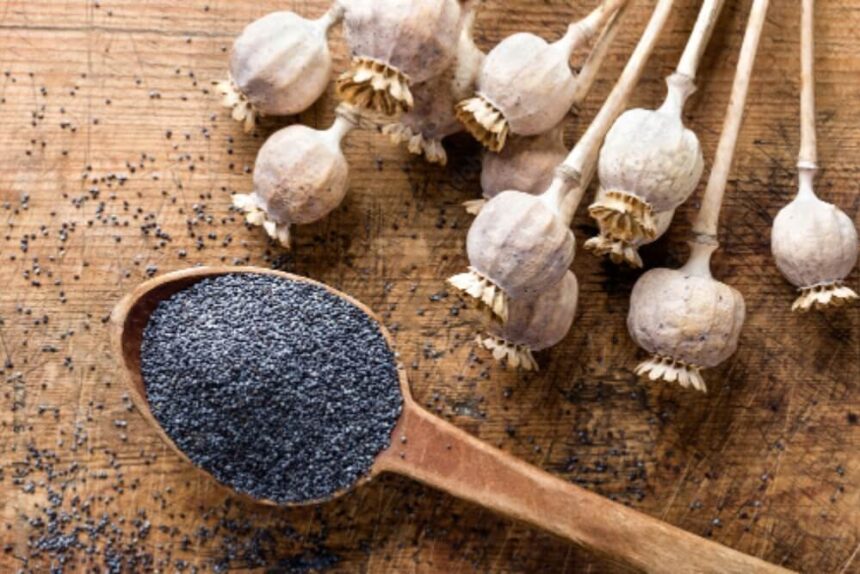Furry, finicky, and forever mysterious – that’s our beloved feline companions. Cats have a way of surprising us with their quirky eating habits. From the leftovers on the kitchen counter to those sneaky nibbles on our dinner plates, they sure know how to keep us on our toes. But when it comes to poppy seeds, can cats eat them? In this blog post, we’re diving deep into this intriguing question while keeping it colloquial and reader-friendly. So, put your feet up, grab a cup of your favorite brew, and let’s explore the world of feline culinary curiosities.
Poppy Seeds: What’s the Scoop?
You’ve probably munched on a poppy seed bagel or savored the nutty flavor in a muffin, but what exactly are these little specks that kitties seem so curious about?
Poppy seeds come from the opium poppy, or Papaver somniferum, a plant with a reputation as complex as it is colorful. Native to countries in the Northern Hemisphere, it’s primarily the opium poppy that gives us those tiny seeds we’ve grown accustomed to. Unripe poppy seeds have a milky latex that’s the source of powerful substances like opium, codeine, heroin, and morphine. But the seeds we sprinkle on our baked goods are the ripe ones, resembling tiny kidney beans in shades of dark blue and gray.
Now, here’s the catch. Those familiar poppy seeds on your bagel? They aren’t brimming with opiates, as you might think. Instead, they can contain trace amounts due to potential contamination during harvesting. It’s the reason why people can end up testing positive for opiates on drug tests after indulging in a poppy seed-laden treat. A mere two hours post-poppy-seed-consumption can lead to unexpected drug test results. Talk about a poppy-seed paradox!
Can Cats Eat Poppy Seeds?
But what about our feline friends? Can they nibble on our poppy seed muffins without a care in the world? Well, here’s the scoop – cats and poppy seeds don’t exactly make the best dining partners.
The Pet Poison Helpline has listed poppy seeds as a toxin for both cats and dogs. It’s not just the seeds; the entire poppy plant can be toxic to cats. However, the seeds themselves aren’t necessarily poisonous unless your furball decides to go all-out on a poppy seed buffet.
So, what happens when cats chow down on these tiny, enigmatic specks? They might experience a range of symptoms, including decreased appetite, vomiting, stomach upset, lethargy, loss of balance, slowed heart rate, and even the dreaded “coma.” While these symptoms can manifest in various ways, cats are more likely to get a bit hyper and excited after indulging in poppy seeds. Dogs, on the other hand, tend to lean towards the sedated and sleepy end of the spectrum.
Before you start panicking, remember that it would take a pretty generous serving of poppy seeds to push your cat into serious trouble. Most of these seed-induced mishaps are somewhat self-limiting as they often lead to vomiting, which acts as a natural purge for the seeds.
Cat’s Diet: Keeping It Carnivorous
Before you start pondering whether your cat should go vegan or join you in your salad endeavors, remember this: cats are obligate carnivores. This means that the lion’s share of their diet should be good old animal protein, preferably around 70% of it.
Why, you ask? Well, because cats are built to digest and absorb animal-based proteins more efficiently. Their bodies are designed to handle meat, not nuts, seeds, or veggies.
The best course of action for your feline companion is to stick with a well-balanced diet tailored for their specific needs. Most commercial cat foods are carefully formulated to provide the right mix of vitamins, minerals, and nutrients, plus a hearty dose of animal protein.
Sure, your cat might sneak a nibble from your plate every now and then, but it’s best to avoid introducing anything into their diet that’s not designed for them. And this includes veering into the world of vegetarian or vegan cat diets, a path that can lead to a plethora of health issues.
The Poppy Seed Predicament: Keeping Kitty Safe
Now that we’ve established that poppy seeds aren’t a kitty’s best friend, you’re probably wondering how to keep your feline friend away from these alluring specks of danger. After all, curiosity killed the cat, right?
1. Watch Your Garden: If you’re an avid gardener who loves to cultivate poppy plants, it’s time to reconsider your flora choices. Poppy plants might be visually stunning, but there are plenty of non-toxic alternatives, such as asters, orchids, or snapdragons, that can grace your garden without posing a risk to your cat.
2. Outdoor Poppy Plants: If you decide to grow poppy plants despite your cat’s curiosity, make sure to place them outdoors where your feline explorer can’t reach them. Cats have a knack for finding the forbidden fruit, so better safe than sorry.
3. Indoor Safeguards: For indoor gardeners, the key is to hang your poppy plants from the ceiling or position them in places that are out of your cat’s sneaky reach. Corners are a favorite haunt for feline mischief, so be extra cautious.
4. Vanish Those Vases: Fresh poppy flowers in a vase might be a lovely sight, but it’s also a temptation for your cat. If you do bring them inside, ensure that they’re in a room with a closed door, off-limits to your furry friend.
5. Artistic Alternatives: To enjoy the beauty of poppies without endangering your kitty, opt for paintings or pictures of these vibrant flowers on your walls. It’s the safest way to incorporate poppy charm into your home decor.
Other Seeds That Cats Can (Safely) Snack On
While poppy seeds may not be the wisest choice for your feline friend, there are other seeds that can be part of their diet without causing harm. These seeds not only lack toxins but also offer nutritional value that can benefit your cat’s health.
Pumpkin Seeds: These are a fantastic choice for your cat as they’re loaded with essential nutrients like iron, zinc, manganese, and antioxidants. Plus, they can help reduce common ailments as your kitty grows older.
Sunflower Seeds: Another seed that’s safe for cats, sunflower seeds are packed with goodness. They can be an occasional treat or a way to add some variety to your cat’s meals.
Chia Seeds: Rich in nutrients and fiber, chia seeds can be sprinkled sparingly in your cat’s diet for a little extra nutritional boost.
Flaxseeds: These little seeds are brimming with omega-3 fatty acids, making them a healthy addition to your cat’s meals.
Hemp Seeds: Hemp seeds are a protein powerhouse, and they can be an excellent addition to your cat’s diet in moderation.
Remember, moderation is the key when it comes to these seeds. You can use them as occasional treats, during training, or to add a sprinkle
to your cat’s meals once a week in small amounts.
In Conclusion: Poppy Seeds and Your Feline Friend
To sum it up, poppy seeds are a no-go for your cat. While it might take a substantial amount of them to cause harm, it’s best not to take chances. Some foods containing poppy seeds may also have other ingredients that aren’t suitable for your cat, making it safer to stick with cat-specific food and treats.
If you ever find your curious feline indulging in poppy seeds or any other questionable nibbles, it’s essential to keep an eye on them. If they exhibit any unusual symptoms or side effects, don’t hesitate to contact your veterinarian for guidance.
Your cat’s health and well-being are paramount, so while you enjoy your poppy seed muffins, ensure your kitty stays far away from the poppy patch. And if your feline friend enjoys the occasional seedy snack, rest assured that there are plenty of safer options to choose from.



